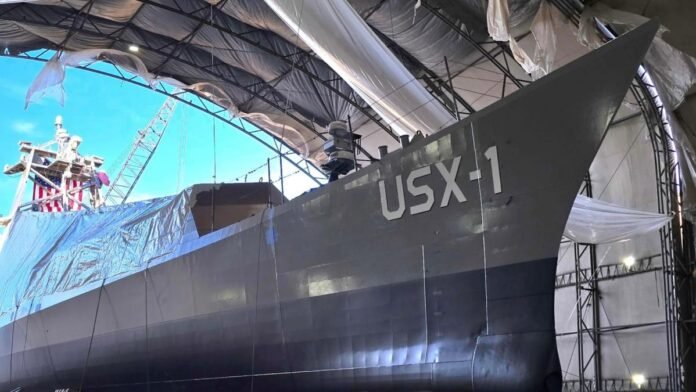US Unveils World’s First 240-Ton Autonomous Warship for Naval Operations
March 5, 2025 – The United States has unveiled the world’s first 240-ton unmanned warship, marking a major leap forward in autonomous naval technology. The cutting-edge vessel is designed to conduct a range of military operations without requiring onboard crew, a move that could redefine modern warfare.
The ship, developed under a high-priority Pentagon program, boasts advanced artificial intelligence, state-of-the-art sensors, and long-range communication systems. It can perform reconnaissance, surveillance, and even combat missions with minimal human intervention. The vessel’s autonomy is powered by sophisticated machine-learning algorithms that allow it to adapt to complex naval environments and execute missions independently.
A Game-Changer in Naval Warfare
Military experts believe that autonomous warships could revolutionize naval strategy by reducing risks to human personnel while increasing operational efficiency. The US Navy has been investing heavily in autonomous systems to strengthen its capabilities amid growing geopolitical tensions.
“The deployment of this unmanned warship is a milestone in our efforts to modernize naval operations,” said Admiral John Richardson, a top US Navy official. “It enhances our ability to maintain maritime security while reducing the need for manned operations in high-risk zones.”
Capabilities and Strategic Advantages
The warship is equipped with cutting-edge radar, sonar, and electronic warfare systems, allowing it to detect and track enemy movements with precision. It can also be integrated with other naval assets, including aircraft carriers, submarines, and destroyers, forming a networked fleet capable of real-time data sharing and coordinated attacks.
Unlike traditional warships, the autonomous vessel requires no onboard crew facilities, allowing for more space dedicated to weapons, fuel, and high-tech systems. This enhances its endurance, enabling long-range missions without the logistical constraints of human support.
Global Implications
The introduction of an autonomous warship raises significant strategic and ethical questions. While the US is leading the charge in naval AI warfare, other global powers, including China and Russia, are also developing autonomous military technologies. The rise of AI-driven naval assets is expected to influence future military doctrines and international maritime policies.
Critics, however, warn about the potential risks of autonomous warfare, including the possibility of AI malfunctions, cyber vulnerabilities, and the lack of human judgment in critical combat situations. Experts emphasize the need for strict regulations and oversight to ensure responsible use of such technologies.
Future Prospects
The US Navy plans to expand its fleet of unmanned warships in the coming years, integrating them with existing manned vessels to create a hybrid force. If successful, this move could redefine naval dominance in the 21st century and set the stage for a new era of autonomous military operations.
With its launch, the 240-ton autonomous warship stands as a testament to the rapid advancements in defense technology, signaling a future where AI-driven warfare becomes a key component of global military strategies.




